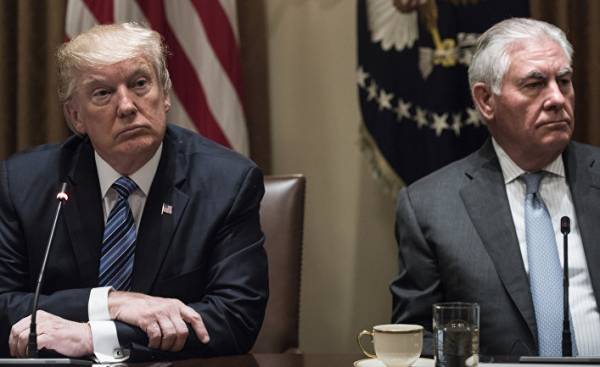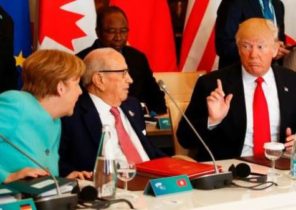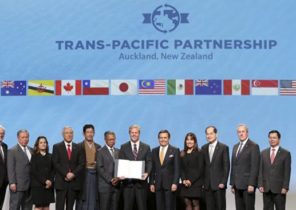
On Friday evening, July 28, the White house announced that President Donald trump plans to sign a bill approved by Congress which will limit its right to cancel anti-Russian sanctions that will be a powerful blow to his relations with Russian President Vladimir Putin.
Given the unanimity of Congress from both parties, and suspicion about its intentions towards the Russian leader, trump has no choice but to sign the bill, despite the fact that the White house strongly opposed its adoption.
“If the administration trump will veto this bill, it will be a reckless move on her part, said one state Department official who participated in the development of sanctions policy. In this case, the Congress will cancel its veto, and the Russian a scandal in Washington flare up even stronger.”
The white house issued a statement in which he tried to save his reputation, suffered as a result of the momentous political defeat. The statement said that trump was negotiating some changes in the text of the bill and that, “given the response on his part, he endorses the bill and intends to sign it”.
The timing for such a statement — summer evening on Friday and on the news about staff mess at the White house led to a relatively modest coverage of the event, which, according to analysts, will lead to significant changes in Russian-American relations.
This bill also imposes new sanctions against North Korea and Iran, was approved by both houses of Congress almost unanimously. This bill requires that the trump in writing expounded the arguments in favor of the lifting of certain sanctions against Russia and that Congress necessarily verified any such attempts.
The members of both houses of Congress is extremely concerned about trump’s desire to establish cordial relations with Putin, despite compelling evidence that Russia intervened in the course of the US presidential election in 2016, and despite the investigation of the alleged ties between team members trump and the Kremlin. Trump and Putin managed to find a common language in the course of several conversations at the summit Big twenty, held earlier in July.
But even before trump has agreed to sign a new bill on sanctions, Putin in anger ordered to reduce the number of employees of the American Embassy in Moscow and to capture part of the estate, which was used by American diplomats in Russia.
This step was a response to the events of December, when President Barack Obama closed two diplomatic complex in Maryland and new York — as punishment for Russia’s intervention in the US presidential election. According to us officials, these complexes were used by Russians to conduct surveillance. The Kremlin claims that they served as places of recreation, and the Minister of foreign Affairs of Russia Sergey Lavrov called the capture of these complexes “robbery in broad daylight”.
In December, Russia failed to enact appropriate measures in response to the capture of Obama and Russian departmenti. According to some, the decision Russia made after a former adviser to trump national security issues, Michael Flynn (as Michael Flynn) promised the Russian Ambassador in Washington that as soon as trump takes office, he will rescind this decision. However, trump hasn’t done that yet, and the sanctions that it is prepared to sign, will make it virtually impossible, given the strong anti-Kremlin mood in Congress.
Friday, 28 July, Russian officials said that relations between Russia and the United States will roll downhill.
“We are not ruling out any steps that, say, result in a feeling of presumptuous Russophobia, which today set the tone on Capitol hill,” said Deputy Minister of foreign Affairs of Russia Sergey Ryabkov.
Ryabkov also warned about the “potentially destructive impact” of this bill.
According to analysts, Moscow still hopes to negotiate with trump, who has long refused to heed the warnings about Putin’s intentions and said that Washington and Moscow can cooperate in the middle East in such areas as counter-terrorism and cybersecurity.
However, the new bill will make such cooperation extremely difficult.
This bill captures those sanctions that Obama has imposed by Executive decrees, and gives Congress 30 days to check any attempt by trump to mitigate the sanctions.
Earlier in July, the Director of legislative activities at the White house mark Short (Short Marc) stated that the bill “creates an unusual precedent for the delegation of foreign policy 535 members of Congress.” Secretary Rex Tillerson (Rex Tillerson) also urged the Congress to deny the President the opportunity to exercise “flexibility” in the talks with Moscow.
This is very similar to the arguments used by the Obama when he urged Congress not to intervene in the negotiations on the Iranian nuclear program. Obama has unsuccessfully fought against the tightening of sanctions against Tehran, and eventually he was forced to give the Congress the final version of the agreement for verification.
But the Obama administration officials who worked on the Iranian agreement, called the current situation with Russia is different.
“Overall, I think that Congress should not go too far in trying to encroach on the prerogatives of the Executive in matters of foreign policy,” said John finer (Finer Jon), who worked as chief of staff in the state Department under John Kerry.
“However, two key differences make the case of Russia is exceptional: the unprecedented intervention (trump is the only person in Washington who is unable to admit it) in our elections and the relentless stream of lies of the administration regarding its relations with Russia, which raises the question of why they want to conclude an agreement with Russia”, — explained the finer.
The white house has made some changes in the text of the bill after the House of representatives and the Senate approved it, including changes, which insisted that the energy company. So it became clear that Trump will have to sign it.
After last week Congress agreed on the bill, in anger trump tweeted that “fake Russian hunt for witches continues,” adding that “it is sad that Republicans, even some of those who came with me, do not attempt to protect the President.”
Trump is not the only critic of this bill outside of Russia. European officials also expressed their concern that this bill may give Trump the right to block investments in energy projects on the continent in which Russia takes part.







